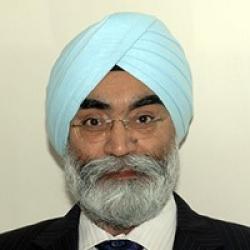Monetary Operations: Tools and Techniques for Policy Implementation 2021 main page
Monetary Operations: Tools and Techniques for Policy Implementation
Monetary Operations: Tools and Techniques for Policy Implementation
May 10 – 13
Chair: Francesco Papadia, former director general for market operations, European Central Bank
What are the short and long-term impacts of the monetary policy response to Covid-19? What are the implications of large central bank balance sheets? Is the digitisation of monetary policy being hindered or accelerated by the consequences of the pandemic? How is climate change impacting monetary policy strategy, conduct and implementation?
These are some of the main challenges facing those working in market operations at central banks in 2021. In addition disruptive forces including climate risk, digital currencies and the Covid-19 crisis are impacting monetary operations in unprecedented ways and impacting emerging economies differently to advanced economies.
Chaired by market operations expert Francesco Papadia alongside speakers from central banks around the world, this course is designed to equip delegates with the frameworks and approaches to meet the monetary policy operations challenges facing the modern central bank in both emerging and advanced economies.
Each day will feature three hours of expert-led live content to maximise the opportunity to share and learn. The course chair will ensure participants have opportunities to network throughout the programme.
US timezone: 8am-11am (ET) |1pm-4pm (BST) | 8pm-11pm (SGT)
Course Agenda
Two weeks prior to your training course you will be emailed access to our content hub with course materials, including a trial to Central Banking if you are not already subscribed. There will be a combination of articles, reports and presentations that will contribute to two hours of preparation time for the live content. Presentations for the sessions will also be held here subject to the speaker approval.
Dealing with Disruptive Forces
13:00 – 13:15
Course introduction
Course introduction session led by the chair
13:00 - 13:15
- Introductions and welcome from the chairperson
- Overview of the training course
- Discussion of the delegate expectations
13:15 – 13:45
Climate risk: impact and implications for monetary policy
13:15 - 13:45
- Climate change as the emerging source of local and systemic instability
- Impact and implications for monetary policy strategy, conduct and implementation
- Overview of new roles and responsibilities for central banks in the areas of green finance and ESG
- Discussion: how are central banks tackling climate risk in the delegates’ home jurisdictions?
Dirk Schoenmaker
Professor of banking and finance
Rotterdam School of Management, Erasmus University Rotterdam
13:45 – 14:00
First break
13:45 - 14:00
14:00 – 14:45
Digital currencies and monetary policy: implications for monetary policy, central banks and central banking
15:00 - 15:45
- Taxonomy of Central Bank Digital Currencies (CBDCs), stable coins and crypto assets
- Impact and implications of CBDCs for markets and portfolios
- Opportunities and risks of CBDCs for monetary policy implementation
- Discussion: will Covid-19 speed the transition to digital currencies?
Carlos Cantu
Economist, representative office for the Americas, Monetary economics department
Bank for International Settlements
Carlos Cantú joined the BIS in the spring of 2016. He obtained his MA and PhD in economics from the University of California, Los Angeles. Before obtaining his PhD, he worked for the Bank of Mexico in the Economic Research Department. He is part of the secretariat of the BIS Consultative Group on Innovation and the Digital Economy Technical Task Force on CBDCs.
14:45 – 15:00
Second break
14:45 - 15:00
15:00 – 15:45
Fed and monetary policy response to Covid-19: recent developments, outlook and wider impact
14:00 - 14:45
- Understanding the state of the art of the Fed’s policy response to the economic impact of Covid-19
- Overview of strategic challenges in the context of the current economic and political climate
- Impact and implications for the global financial system
- Expectations in relation to further steps and policy developments
Building an Effective Framework for Policy Implementation
13:00 – 13:45
What (not) to say to markets, when and how?
13:00 - 13:45
- The role of communication with markets in monetary policy design and implementation
- Overview of key signals that market participants are looking for in policy announcements
- Examples of frameworks and processes ensuring that central banks’ messages are consistent and context-sensitive
- Hands-on activity: how to communicate in time of market stress or volatility
Niko Herrala works as a Head of Division in the Market Operations Department at the Bank of Finland. He is also a member of ESCB's Working Group on Monetary Policy Implementation.
13:45 – 14:00
First break
13:45 - 14:00
14:00 – 14:45
The new toolkit for optimising monetary policy operations
14:00 - 14:45
- Evolution of approaches for managing domestic liquidity and monetary policy operations
- Frameworks for tackling challenges at both strategic and day-to-day level
- Key features of the modern monetary operations toolkit
- Case study: monetary operations framework at the European Central Bank
Francesco Papadia is chair of Prime Collateralised Securities, chair of the Selection Panel of the Hellenic Financial Stability Fund, resident fellow of Bruegel and lectures at various Universities. Between June 1998 and May 2012 he was director general for Market Operations at the European Central Bank. Before that he held different positions at Research Department and Foreign Department of Banca d'Italia. Between 1980 and 1983 he was economic advisor at the Directorate General for Economic and Financial Affairs of the European Commission. From 1974 to 1979 he served as economist in the Research Department of Banca d'Italia. Francesco Papadia holds a degree in Law from the University of Rome. He did his postgraduate studies in Economics at Istao, Ancona and at the London Business School. He has published numerous articles and books.
14:45 – 15:00
Second break
14:45 - 15:00
15:00 – 15:45
International monetary policy spillovers and responses
15:00 - 15:45
- Examples of monetary policy spillovers from advanced to emerging market economies
- Overview of measures taken in emerging markets in response to these effects
- Spillover implications of the Fed monetary policy tightening
- Discussion: how do monetary policy spillovers get tackled in the delegates’ home jurisdictions?
Andy is currently a Visiting Fellow at the Hoover Institution, Stanford University. He worked at the BIS from 2002-21 where, most recently, he held the position of Head of Monetary Policy and, prior to that, Head of Economics for Asia and the Pacific. Before joining the BIS, he served on the staff of President Bush’s Council of Economic Advisers, was an Assistant Vice President and Economist at the Federal Reserve Bank of Kansas City, taught as an Adjunct Associate Professor at the University of Chicago Graduate School of Business, was a visitor at the IMF, and has worked with many central banks across the globe during his career. Andy has authored numerous publications in the fields of international monetary policy, macroeconomics, and financial stability. Andy holds a Ph.D. in economics from the University of Chicago.
From Collateral to Liquidity Management: Emerging Risks and Opportunities
13:00 – 13:45
Monetary policy in India
13:00 - 13:45
- Overall monetary policy
- Inflation targeting
- Debt management
- Banking regulation/supervision
- Non banking finance companies (shadow banking)
Dr. Charan Singh is currently serving as the Non Executive Chairman of Punjab & Sind Bank. He was full time visiting faculty and former RBI Chair Professor (Dec 2012 to Dec 2016) at the Indian Institute of Management Bangalore, India where he taught comparative monetary policy and policy issues in Indian economy.
Earlier, he was a Senior Economist at the Independent Evaluation Office of the International Monetary Fund, Washington DC from August 2009 to November 2012 and Research Director (Departments: Economic Policy, Debt Management) at the Reserve Bank of India (1997–2009). Singh earned his doctorate in Economics from the University of New South Wales, Sydney, Australia. He was a visiting scholar for more than a year each at Department of Economics, Harvard University and the Stanford Center for International Development, Stanford University. He is now serving as Director on the Board of National Housing Bank, Delhi and NABARD Financial Services Ltd, Bangalore. He is also Member, Governing Board at Policy Foundation, New Delhi; Member of Research Advisory Committee, BIRD, National Bank for Agriculture and Rural Development; Honorary Fellow, SKOCH Development Foundation; and Member of the Informal Advisory Group on Housing Sector Issues, IMF, Washington DC
13:45 – 14:00
First break
13:45 - 14:00
14:00 – 14:45
Prudential measures and monetary policy - focus on Basel III framework and its macroprudential component
14:00 - 14:45
- Interconnections between prudential banking regulation and monetary policy
- International banking regulations: historical perspective and horizon
- Current prudential framework (Basel III/IV)
- Coordination and cooperation between different dimensions of monetary policy, micro and macroprudential regulation
Bozena Gulija
Financial regulation and risk management expert
Former Croatian National Bank and European Court of Auditors
Bozena Gulija is a financial sector professional with primary expertise in banking regulation and risk management, whose experience spans the private and public sector across several jurisdictions (EU, Netherlands, Belgium, Germany, Luxembourg and Croatia). She has worked for private companies including ABN AMRO, Euroclear, State Street, Nordea, and Intesa Sanpaolo Group, and public institutions such as the European Court of Auditors, the Croatian National Bank, and the Institute for International Relations. Bozena has been actively collaborating with several professional and academic institutions through lectures and research projects (e.g. Warwick University, Zagreb University, IADI-BIS, Central Banking, Risk.net) and as an author and reviewer (e.g. Financial Regulation International, IFLR - International Financial Law Journal, Journal of Banking Regulation).
Linkedin: https://www.linkedin.com/in/bozenagulija
14:45 – 15:00
Second break
14:45 - 15:00
15:00 – 15:45
Delivering accurate and timely liquidity forecasts
15:00 - 15:45
- State of the art of liquidity forecasting tools, methods and techniques
- Overview of key challenges faced by central banks in today’s volatile markets
- Examples of frameworks helping to avoid forecasting errors
- Hands-on activity: stylised forecasting exercise
The Future of Monetary Policy
13:00 – 13:45
What next for central bank balance sheets?
13:00 - 13:45
- Quantitative easing and tightening: symmetrical or asymmetrical effects?
- Liquidity management and quantitative tightening
- Respective roles of interest rate increases and quantitative tightening to fight inflation
- Discussion: the future of central bank balance sheets and money market operations
Roberto Motto is Senior Adviser in the Directorate General Monetary Policy of the European Central Bank (ECB). He holds a Ph.D. in Economics from the University of York. He has worked at the ECB since 2000. His expertise is in monetary policy and macroeconomics. He has published in several international journals such as “American Economic Review”, “Journal of Monetary Economics”, “Journal of Money, Credit and Banking”, “Journal of Economic Dynamics and Control”, and has co-authored a book on the history of the ECB monetary policy.
13:45 – 14:00
First break
13:45 - 14:00
14:00 – 14:45
Monetary policy in 2021: leaning against or with the wind?
14:00 - 14:45
- Assessment of dilemmas, conflicts and trade-offs between monetary operations and the financial stability mandate
- Implications for central banks’ independence and accountability
- Overview of key factors and dynamics that will shape the framework for monetary policy operations in the years to come
- Discussion: future of monetary policy in the delegates’ home jurisdictions
Francesco Papadia is chair of Prime Collateralised Securities, chair of the Selection Panel of the Hellenic Financial Stability Fund, resident fellow of Bruegel and lectures at various Universities. Between June 1998 and May 2012 he was director general for Market Operations at the European Central Bank. Before that he held different positions at Research Department and Foreign Department of Banca d'Italia. Between 1980 and 1983 he was economic advisor at the Directorate General for Economic and Financial Affairs of the European Commission. From 1974 to 1979 he served as economist in the Research Department of Banca d'Italia. Francesco Papadia holds a degree in Law from the University of Rome. He did his postgraduate studies in Economics at Istao, Ancona and at the London Business School. He has published numerous articles and books.
14:45 – 15:00
Second break
14:45 - 15:00
15:00 – 15:30
Closing remarks and delegate action plans
Concluding session led by the chair
15:00 - 15:30
- Summary of the course
- Discussion of the observed trends and case studies
- Application of learning points in the delegates’ home organisations
- Preparation of action points
The Implementation Workshop is a chair-led forum where attendees will have the opportunity to discuss challenges around implementing the ideas they have learnt during the Live Content. Prior to the workshop you will be emailed questions to prepare in order to gain the most from the session with peers.
13:00 – 14:00
Implementation Workshop
11:00 - 12:00
Benefits of attending the Implementation Workshop:
- Developments in the area since the live content sessions, including new resource material
- Questions arising since returning to the central bank
- Challenges of implementation: where are the roadblocks?
- Medium-term goals: what is realistic?
- Establishment of group network to keep in touch with peers and share best practices
Learning outcomes
At the conclusion of the training, participants will be able to:
- Understand the strategic challenges to monetary operations in the context of the economic and political climate
- Assess the implications and opportunities that CBDCs have on monetary policy
- Tackle the impacts that climate risk has on monetary policy
- Gain insight in to the Libor transition and the key features of the SOFR framework
- Create liquidity forecasts and use tools and methods to overcome key challenges of volatile markets
Chair

Francesco Papadia
Former director general for market operations
European Central Bank
Francesco Papadia is chair of primary collateralised securities, chair of the selection panel of the Hellenic Financial Stability Fund, resident fellow of Bruegel and lectures at various universities. Between June 1998 and May 2012 he was director general for market operations at the European Central Bank. Before that he held different positions at Research Department and Foreign Department at the Bank of Italy. Between 1980 and 1983 he was economic advisor at the Directorate General for Economic and Financial Affairs of the European Commission. From 1974 to 1979 he served as economist in the Research Department of the Bank of Italy. He holds a degree in law from the University of Rome and did his postgraduate studies in economics at Istao, Ancona and at the London Business School. He has written numerous articles and books.






